Rad Na (also called Rat Na / Lad Na) is popular Thai street food. It is a fried noodles dish topped with gravy with meat and vegetables. The noodles used for Rad Na are flat rice noodles. It is fried in the wok with some oil and dark soy sauce until the surface is charred slightly, then placed on a serving dish.
The Rad Na gravy is made with stock. It can be chicken stock, pork broth, etc. Chicken, pork, and Chinese broccoli are the typical ingredients. Once cooked, the sauce is thickened with cornstarch slurry, poured on the fried noodles, and served right away. Follow this easy Rad Na recipe to make your favorite Thai noodles at home.
Use fresh rice noodles for making Rad Na
Most Thai restaurants use thin rice noodles to make rad na. You can also use wide flat rice noodles, although less common. You can also use dried rice noodles if fresh wide rice noodles are unavailable. Follow the instructions on the packaging to rehydrate them before use.
The gravy is thickened with tapioca starch or cornstarch. It is essential to use cold water to constitute the tapioca or cornstarch slurry, as it can become lumpy if using hot water.
Note: This post may contain affiliate links. Please read my privacy policy for more info. I may receive commissions for purchases made through links in this post. As an Amazon Associate, I earn from qualifying purchases.
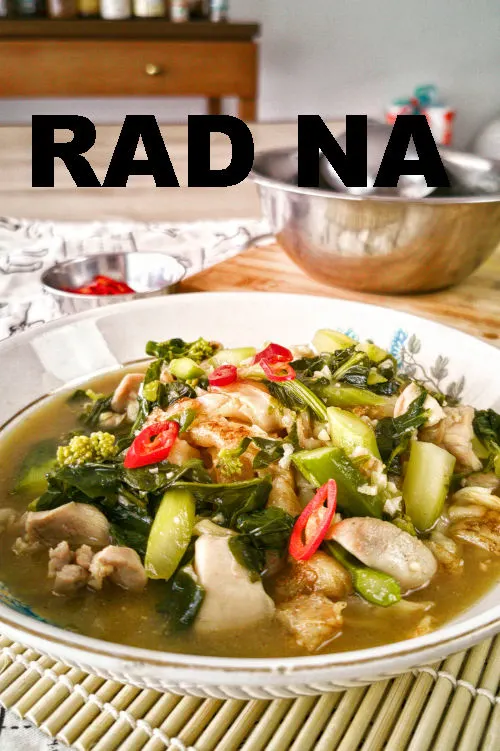
Variations
There are similar noodle dishes to Rad Na in other Southeast Asia countries. It is called Wat Dan Hor / Wat Tan Hor / 滑蛋河 in Malaysia, equivalent to Rad Na noodles. The entire cooking process for both noodles is identical, except the Malaysian do not include the fermented yellow bean sauce (Taucu) as the seasoning. Instead, dark soy sauce is used more liberally while cooking. They also like to add an egg to thicken the sauce at the last cooking step, like making egg drop soup.
The cooking oil for preparing Rad Na must be of high smiling point as it involves medium heat to high in the stir-frying process. Palm oil and peanut oil are commonly used in Thai cooking as they have a high smoking point. On the other hand, olive oil is not suitable as it has a distinct flavor that is not considered authentic Thai ingredients. Now let’s get into the detail of the cooking process.
1. Marinate and stir-fry the meat
The main protein for rad na is usually chicken or pork, although you can also use firm tofu for a vegetarian twist. The meat should be in small pieces since stir-frying is a quick-cooking process.
- Marinate the meat with salt, light soy sauce, ground white pepper, sesame oil, and cornstarch for an hour.
- Heat a tablespoon of oil in the wok. I like to use a well-seasoned cast-iron wok to fry the noodles, as it can withstand high heat and is non-stick. Alternatively, you can use a little more oil with a stainless steel wok or a good-quality non-stick pan.
- Fry the flat rice noodles over medium-high heat with dark soy sauce. Spread the noodles thinly on the wok surface and let it sears for a few seconds before flipping over to the other side. When the noodles’ surface has turned slightly charred, remove and place the noodles on a serving plate.
2. Prepare the vegetables
The typical vegetables for making Rad Na are Chinese broccoli (Gai Lan ). Some street food vendors also include baby corn to stir fry, which provides more crunchiness and a variety of colors. These ingredients are also commonly used in preparing other Thai recipes like pad kee mao (drunken noodles), pad Thai and pad see ew (soy sauce fried noodles).
Trim off the fibrous surface of the Gai Lan stem, then cut into two to three sections. You can substitute the Gai Lan with regular broccoli or Choy Sum. I keep the recipe simple, but you can always include some baby corn and carrots slices into the recipe.
3. Stir-fry the Gailan
Now let’s start the stir-frying process.
- First, saute the chopped garlic in oil until aromatic. It does not need high heat at this moment as garlic can burn quickly,
- Once the garlic has turned aromatic, add the marinated chicken (or marinated ender pork) into the wok and stir-fry with the garlic. Once the chicken is cooked and slightly golden brown, remove it from the wok.
- Now stir fry the Chinese broccoli (Gai Lan) over medium heat until it turns soft. You may need to add some oil if it is insufficient. Then add two to three tablespoons of water to the Gai Lan and cook the Gai Lan until tender-crisp.
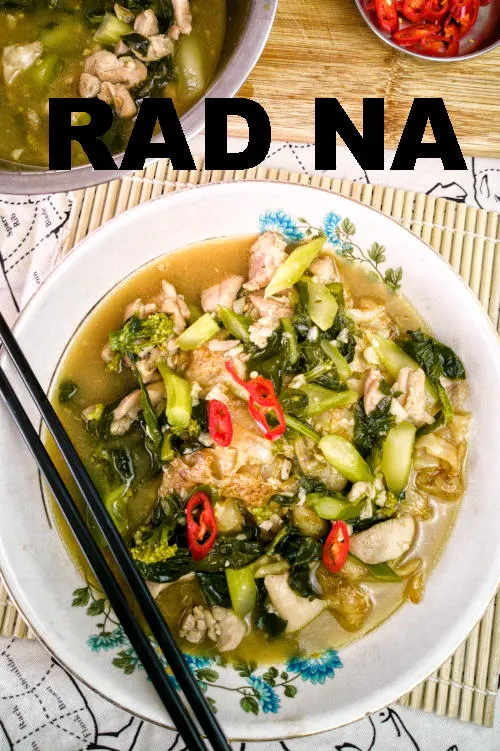
4. Make the Rad Na gravy
The next step is to prepare the rad na sauce.
- Add the broth (chicken broth or vegetable broth), fermented soybean paste (taucu), Golden Mountain sauce, fish sauce, sugar, and ground white pepper to the broccoli. Let it return to a boil. Most Asian grocery stores keep the fermented soybean paste and Golden Mountain sauce. (Golden Mountain sauce is similar to light soy sauce but is slightly saltier with a hint of sweetness. It is a staple for Thai dishes. You can substitute it with light soy sauce if unavailable.)
- Return the cooked chicken (or other protein) to the wok.
- You need to thicken the thin sauce to form a gravy that can adhere to the noodles’ surface while serving. You can thicken the sauce with either potato starch, cornstarch, or tapioca starch slurry. Add a large teaspoon of starch to 1-2 tablespoons of cold water to form a slurry, then mix into the sauce while stirring quickly. You may not need all the slurry and stop adding once the desired thickness is achieved.
- Finally, pour the thick gravy with the vegetables and meat onto the fried flat noodles. Garnish with some red chilies and serve immediately.
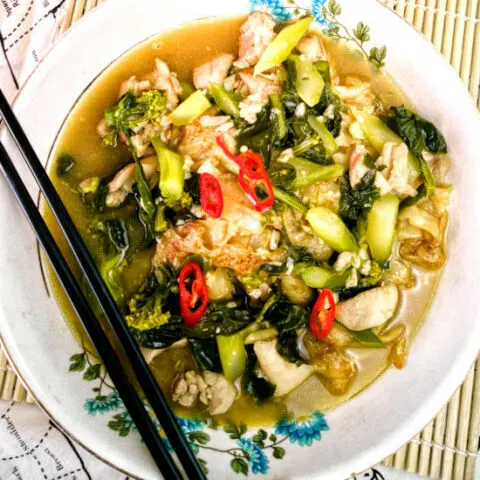
Rad Na - Thai stir-fry rice noodle with gravy
Rad Na (also called Rat Na / Lad Na) is a popular Thai street food. It is a fried noodles dish topped with gravy with meat and vegetables.
The noodles used for Rad Na are flat rice noodles. It is fried in the wok with some oil and dark soy sauce until the surface is charred slightly, then placed on a serving dish.
Ingredients
Ingredients A
- 500g flat rice noodles
- 1tsp dark soy sauce
- 1 tbsp vegetable oil
Ingredients B
- 300g chicken thigh meat, cut into bite-size
- 1/2 tsp salt
- 2 tsp light soy sauce
- 1/4 tsp ground white pepper
- 1/2 tsp sesame oil
- 1/2 tsp cornstarch
Ingredients C
- 2 tbsp vegetable oil
- 1 tbsp chopped garlic
- 5 stalks of Chinese broccoli
- 2 cups chicken stock
- 1 tbsp fermented bean paste (taucu)
- 1 tbsp Golden Mountain sauce
- 1 tsp fish sauce
- 1 tsp sugar
- 1/4 tsp ground white pepper
- 1 tbsp cornstarch (to make a slurry)
- Chopped red chili to garnish
Instructions
- Fry the noodles with oil and dark soy sauce in a wok over medium to high heat until both sides become slightly charred. Remove and place the noodles on a serving plate.
- Marinate the chicken with ingredients B for one hour.
- Trim off the fibrous surface of the Chinese broccoli's stem. Cut the stem into slices and the leaves into 2-3 parts.
- Saute the chopped garlic with oil until aromatic.
- Add the chicken and continue stir-frying with the garlic until the chicken is cooked. Remove from the wok.
- Stir-fry the Chinese broccoli with some oil until fragrant. Add 1-2 tbsp of water if it is too dry.
- Add the stock, fermented soybean paste, Golden Mountain sauce, fish sauce, sugar, and ground white pepper to the broccoli. Let it returns to a boil.
- Add the cooked chicken, and wait until it boils again.
- Thicken the sauce with sufficient cornstarch slurry to form a thin gravy.
- Pour the gravy and the ingredients on top of the noodles.
- Garnish with sliced red chilies and serve.
Recommended Products
As an Amazon Associate and member of other affiliate programs, I earn from qualifying purchases.
-
 Red Boat - Fish Sauce, 8.45 Ounce - Chef’s Grade, Gluten Free, Sustainably Sourced & Artisan Processed, 100% Pure, Protein Rich, No Added MSG or Preservatives.
Red Boat - Fish Sauce, 8.45 Ounce - Chef’s Grade, Gluten Free, Sustainably Sourced & Artisan Processed, 100% Pure, Protein Rich, No Added MSG or Preservatives. -
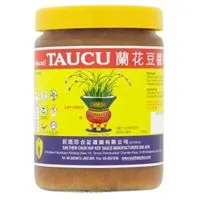 Cap Orkid Minced Taucu 475g (628MART) (3 Count)
Cap Orkid Minced Taucu 475g (628MART) (3 Count) -
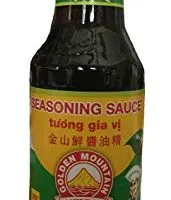 Golden Mountain Seasoning Soybean Sauce - 6.8 fl oz bottle
Golden Mountain Seasoning Soybean Sauce - 6.8 fl oz bottle -
 Thai Kitchen Stir Fry Rice Noodles, 14 oz
Thai Kitchen Stir Fry Rice Noodles, 14 oz
Nutrition Information:
Yield: 2 Serving Size: 1Amount Per Serving: Calories: 1188Total Fat: 55gSaturated Fat: 12gTrans Fat: 1gUnsaturated Fat: 37gCholesterol: 241mgSodium: 3037mgCarbohydrates: 105gFiber: 10gSugar: 14gProtein: 69g
This data was provided and calculated by Nutritionix on 2/11/2022

Ade (Adeline Lee)
Thursday 17th of February 2022
Thanks. Will try to cook this
Hoon
Wednesday 16th of February 2022
Hihi where to get golden mountain sauce in Kuala Lumpur
KP Kwan
Friday 18th of February 2022
I bought it at NSK Kuala Lumpur.
Adeline
Wednesday 16th of February 2022
Any substitute for golden Mountain sauce. Thks
KP Kwan
Friday 18th of February 2022
Omit this sauce and add a bit more light soy sauce should do the trick.
KP Kwan
Wednesday 16th of February 2022
Hi, this is KP Kwan. I am happy to see you in this comment area, as you have read through my recipe. I am glad to reply to any questions and comments as soon as possible.
Hoon
Thursday 17th of February 2022
@KP Kwan, Hihi where can we get the golden mountain sauce in Kuala Lumpur